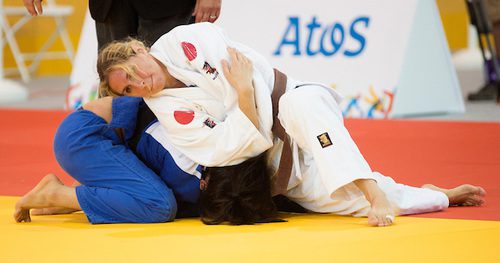RIO DE JANEIRO, Brazil – Priscilla Gagné came just 57 seconds shy of grasping bronze in judo on Thursday in her first ever Paralympics.
After leading for 3:03 of the four-minute women’s 52-kg judo bronze medal match, the Paralympic rookie surrendered a yuko (a judo technique that rewards the attacker with one score) to her Uzbekistani opponent, Sevinch Salaeva, which turned out to be all the points the eventual winner needed.
Gagné admits Salaeva earned victory fairly, but she doesn’t feel the same way about how her initial fight went down.
“There’s only ever probably two [matches] that really bothered me when [I lost] when I don’t think I should’ve, it’s happened twice,” said Gagné, at Carioca Arena 3, shortly after her final match. “I don’t mind losing when it’s really earned, so it was a little disappointing; the first one for sure.”
The Canadian’s debut in the Games was a short one; she lost her opening quarterfinal match on Thursday morning, but rebounded later with a dominating performance in the final of repechage B, enabling her to compete for bronze.
Gagné’s first loss came as a result of a shido (a penalty), that she says was given for being too passive on a couple of attempts where her opposition was trying to attack her, but her coach Andrzej Sadej disagreed.
“Speculation in sport is never going to end, but this is indeed the case: if her first match wasn’t refereed in such a way as it was, she should have won that first match,” said Sadej, who was born in Poland and has been involved with Canada’s national program since the early 90’s.
“She would be standing on the podium right now because she would face different opposition later rounds and everybody whom she would’ve faced in that situation would be [a] person she’s already defeated in the past season.”
The coach’s complaints go beyond just that particular match, his overall beef is with the International Blind Sport Federation (IBSA) and the International Paralympic Committee (IPC), regarding the current classification of judokas and how it doesn’t adequately differentiate between those who he says are really blind and those with visual impairments.
“Some teams here [are] being represented by people whom I [would] rather see in able-body competition than here.”
Sadej says he’s not the only coach that has informed the IBSA and IPC about these concerns and discussions have occurred, but until changes are made, “the Paralympic movement at least in my sport is not going to flourish because it simply not a fair completion.”
Whether fair or foul, Gagné appears to have accepted her results and is ready to move on.
“I have a couple of regrets that I could have done differently but you can’t let it destroy you … you can let it destroy you, or you can use it as fuel to make you come back stronger; harder; learn from it more and let yourself grow. I choose the latter.”

